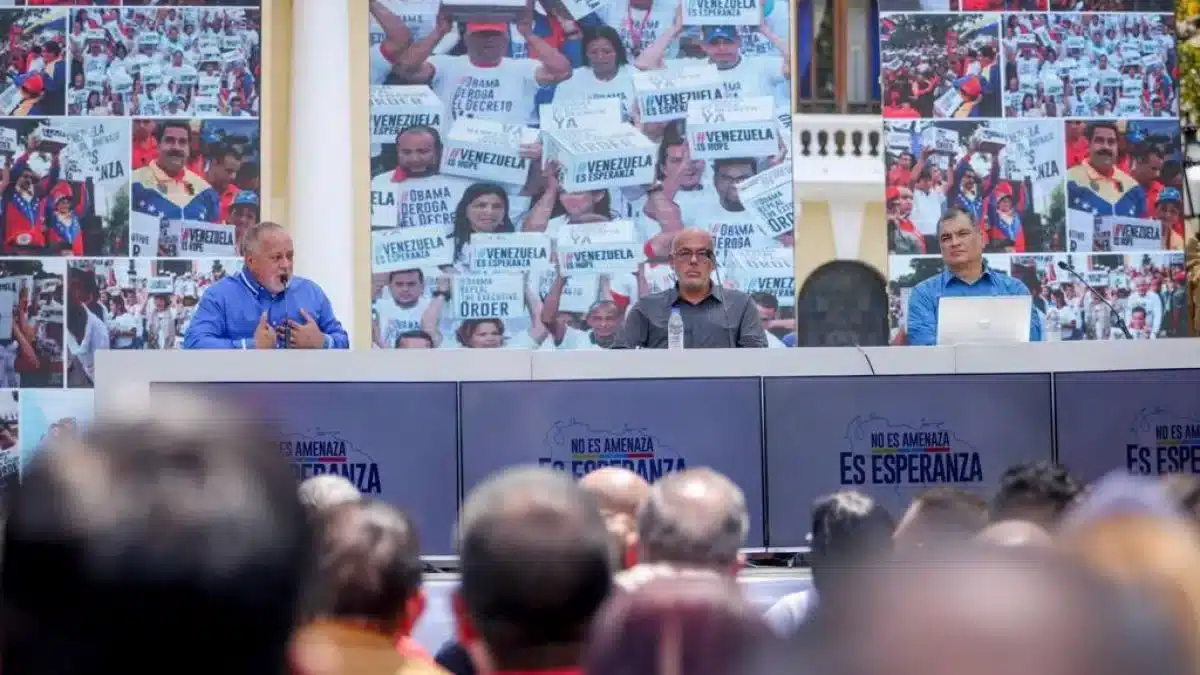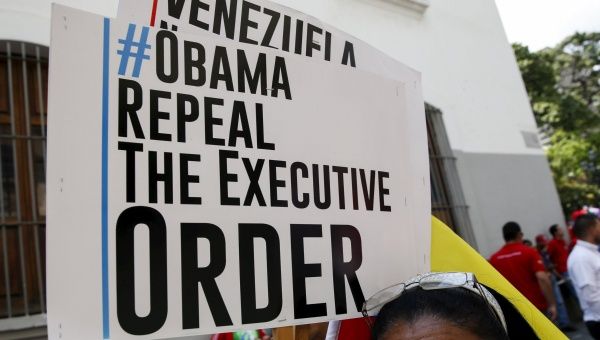
PSUV leader Diosdado Cabello speaking at the commemorative event on the Day of Bolivarian Anti-Imperialism, accompanied by Venezuelan National Assembly President Jorge Rodríguez and Ecuadorian ex-President Rafael Correa. Photo: Con El Mazo Dando.

Orinoco Tribune – News and opinion pieces about Venezuela and beyond
From Venezuela and made by Venezuelan Chavistas

PSUV leader Diosdado Cabello speaking at the commemorative event on the Day of Bolivarian Anti-Imperialism, accompanied by Venezuelan National Assembly President Jorge Rodríguez and Ecuadorian ex-President Rafael Correa. Photo: Con El Mazo Dando.
On Thursday, March 9, Venezuela celebrated the Day of Bolivarian Anti-Imperialism. This day marked the eighth anniversary of the signing of Barack Obama’s executive order against Venezuela, declaring the country an unusual and extraordinary threat to US national security.
PSUV Vice President Diosdado Cabello, in his speech at the commemorating event in Casa Amarilla (seat of the Foreign Affairs Ministry of Venezuela), called non-governmental organizations (NGOs) a danger to democracy. He highlighted the importance of the new Venezuelan law to regulate the operation and activities of these organizations and the international financing they receive. The law is modeled on the United States Foreign Agents Registration Act (FARA), passed in 1938.
“NGOs are a danger to the world, to democracy,” Cabello said. “They are not non-governmental organizations. They depend on a government, the government of the United States, which gives them money.”
These statements came a few hours after massive protests erupted in the capital of the former Soviet republic of Georgia, Tbilisi, allegedly against a new law approved by the Georgian parliament to regulate NGO operations in the country. That law is also modeled after the US FARA, but the media has described it in a Manichean way as a law inspired by Russian legislation. The protests appear to have similar characteristics to the color revolutions backed and funded by the United States in Eastern Europe and West Asia a few years ago.
Venezuela Won’t Go Back to México Talks Unless All Sanctions Lifted
Cabello also highlighted that the rejection of the Free Trade Area of the Americas (FTAA) was one of the most extraordinary defeats suffered by US imperialism and interventionism in Latin America.
“Here, they tried to impose the FTAA on us, but thanks to some presidents of the region and Commander Chávez, we said no to the FTAA,” Cabello stated. “With the FTAA, imperialism intended to enter our countries through economic means and, thus, dominate us.”
Before this great triumph against US imperialism, President Hugo Chávez had warned that the White House would not give up its intentions of colonizing Latin America. “He was not wrong,” Cabello added, pointing out that hostilities against Venezuela and the leftist governments in the region continue.
Cabello also called attention to the “coincidence” that after rejecting the FTAA, several leftist presidents began to get seriously ill. Chávez and Nestor Kirchner, president of Argentina, even passed away from their illnesses. “That is very suspicious. From the probabilistic point of view, it is impossible,” Cabello emphasized.
He also condemned the aspirations of the Venezuelan right wing to do away with the Constitution of the Bolivarian Republic of Venezuela. He underlined that “the people came to power” through the constitution promoted by Commander Hugo Chávez.
Obama decree
On March 8, 2015, then-US President Barack Obama issued an executive order declaring Venezuela an “unusual and extraordinary threat to the national security and foreign policy of the United States of America.”
Executive Order 13692, dubbed the “Obama Decree,” laid the legal, political and administrative groundwork for the imposition of hundreds of unilateral coercive measures against Venezuela.
The sanctions, which opened up the possibility of freezing Venezuelan assets in the US and other countries, were supposedly aimed only at high-ranking Venezuelan government officials.

However, time has shown that the so-called sanctions have negatively affected all aspects of the lives of the Venezuelan people. The coercive measures could be extended to “any person” that the US secretary of the treasury, in consultation with the secretary of state, deemed to be “responsible for or complicit in” actions that the White House unilaterally branded “unlawful.” Due to this, Venezuelan government institutions, public and private industries, banking and financial institutions, the agricultural sector, and government and private individuals were brought under the sanctions regime over the years. It has decimated the lifeline of the Venezuelan economy — the oil sector — and devastated the economy, leading to hyperinflation never seen before anywhere in the world.
(RedRadioVE) by Dubraska Esteves with Orinoco Tribune content
Translation: Orinoco Tribune
OT/SC/SF